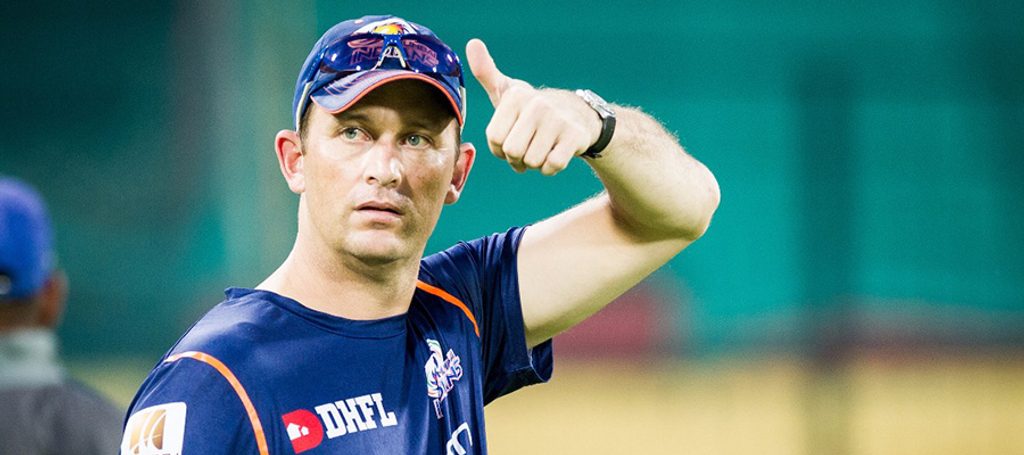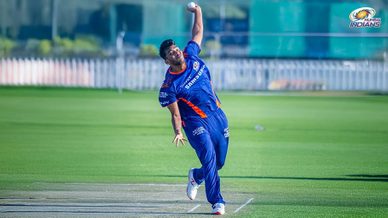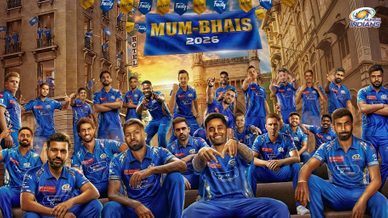
The brain behind the bowling
It’s the brain that prompts all parts of a human body to carry out their actions. It’s the brain that sends signals and gives direction to one’s limbs to move. It’s the brain where all the planning and strategy is made – the epicentre of all activity. Cricket is primarily divided into three parts – batting, bowling and fielding. IPL 2017 champions, Mumbai Indians have a beefed up coaching staff to cater to each of these three departments and much more. Kiwi legend and birthday boy, Shane Bond was in-charge of our bowling and did a fabulous job with all our boys in our title-winning season. Let’s take a look at how he helped our bowling department put in some of the best performances in the tournament.
It was indeed a boon for Mumbai Indians to have the likes of Lasith Malinga, Mitchell Johnson, Mitchell McClenaghan and Jasprit Bumrah in their ranks, but Bond the true tactician ensured with his strategy that the right bowler bowled at the right time for Mumbai Indians, especially during crunch situations. Many bowlers think about what kind of delivery to bowl when they are given an opportunity in the death overs. Bond, as a bowling coach, emphasises on something else before deciding on bowling a particular line or length. “My philosophy around death bowling is that you have to set a field that makes a batsman think you can bowl either close to him or wide of him. So, it creates doubt in the batsman’s mind. From the bowler’s point of view, setting a field gives me the option to bowl a variety of deliveries. There are three primary options – the yorker, the slower ball or the bouncer.”
Bond also explained what kinds of fields are usually best suited for bowlers to go with during the death overs. “The easiest thing to do would be to set a field with a third man, a deep point and a long off. You can then have two men, deep in the leg side. However, the problem with that is it telegraphs the line you are going to bowl. It instantly means that the ball is going to be bowled at the wide line. The batsman can move across to reduce the margin of his errors.”
Assessing all the possibilities and damage-control plans, Bond had one advice for his bowlers. “I would tell my bowlers; do you want the batsman looking to hit over your head for a six, or would you prefer them trying to play with just half a bat. That would be a high-risk, low-percentage option for batsmen. It also gives the bowlers an option of the batsmen nicking the ball. If you get nicked for four, it is bad luck. I’d much rather protect the straighter boundaries, in front of the wicket. I’d also prefer to have someone back on the leg side (around deep square leg). This will give the batsman a message that you might get the ball at your face. That keeps the batsman on the back foot, a little bit as well.
Our bowlers used a good mix of full and wide deliveries and the straighter yorkers, along with slower ones and the occasional bouncer. In the games against Sunrisers Hyderabad at home and against RCB in both the meetings, our bowlers exemplified Bond’s tactics.
Many commentators usually go on about bowling the yorker at the stumps. It may work out pretty often for the bowler, but if the mark is missed, chances are that the ball could disappear into the crowd. The ball could turn into a half-volley or a full toss, as are the cases on most occasions. Shane Bond takes bowling at the stumps out of the equation and prefers having the bowler try two things. “With the batsman moving around, the line is effectively moving around too. That is why it’s such a difficult task to bowl Yorkers. So, what I say to the bowlers is to try and do one of two things. You’ve either got to bowl at the wide line, so if the batsman is swinging at the ball, it hits the toe-end of his bat and you are away from his power zone. The other option is that you almost have to bowl into the back of the heel.”
MI’s bowling attack bailed the team out of trouble more than once. The first instance was perhaps against Sunrisers Hyderabad when their top order was in prime form. However, Bumrah, Malinga and McClenaghan got together and created a landslide that took kept them under 160. Delhi bore the brunt of Bond and the MI bowler’s tactics twice. In the first game, a clash at home, our batsman scored just 142. The bowlers put in a spirited and an aggressive performance to first reduce the Delhi batting order to 24/6 and then restrict them to just 128 in their 20 overs. In the second meeting against Delhi, our bowlers decimated their line-up, bowling them out for 66. The bowling department struck perfectly as a group.
Jasprit Bumrah made Bond very proud after his excellent Super Over against Gujarat Lions in which he defended just 11 runs against two dangerous batsmen, Brendon McCullum and Aaron Finch. “He makes me look very good when he bowls like that,” chuckled Bondy after the nail-biting game. Bumrah was all praises too, for his bowling coach and he owes him a lot for the success he has found in this taxing tournament. “The plans we made in the bowling sessions and in the bowlers’ meetings have all helped me. We have been able to execute the plans well.
More was to come out of our bowlers after our backs were up against the wall at the end of the first Qualifier, against Pune. In the second Qualifier, Karn Sharma and Jasprit Bumrah paired up to humble Kolkata, and the batters did the rest in the chase. The final was high on intensity and having put up a relatively low total on the board, the onus was on the MI bowlers to pull the team out of the rut and take them to the third title. That is exactly what they did.
Shane Bond epitomises the ‘never say die’ attitude in all the bowlers. His plans are precise and team-specific. Bond may not have played a great amount of T20 cricket in his career, but his mind has got the perfect sense of how batsmen size up bowlers in the tough format. For a guy who wasn’t known as any kind of batsman, he has the capability to think like a batsman, and get the bowlers he coaches to outsmart them during the most stringent situations in the T20 game. MI’s bowling coach couldn’t have asked for a better birthday present than the third IPL title that the team won on May 21st. Happy birthday Shane Bond!
Trivia about Bond:
⦁ Shane Bond was a professional police officer in Christchurch
⦁ Bond idolised Sir Richard Hadlee and Sir Ian Botham





